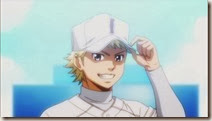 |
 |
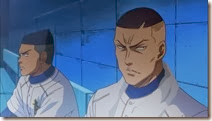 |
I’d recognize that voice anywhere…
It’s all about separating the wheat from the chaff on this week’s Daiya no A. Everything in Japanese high school baseball is about getting to Summer Koushien at any cost (it’s probably the most popular single sporting event in Japan, including the Olympics and World Cup) so it’s no surprise that the schools are as obsessed with it as their fans. And this series is proving itself to be pretty meticulous about showing all the intermediate steps leading up the main event, none of which are critical in their own right but each of which are a part of a critical process.
After a rare nugget of voice-over narration, we launch right into the first game of the double-header – a round-robin featuring Seidou against two other Tokyo schools, Inashiro and Shuhoku. Both of them are presumably very good programs, but it’s Inashiro that gets most of the spotlight here – and in doing so, the likely honor of being the inevitable “fated foe” that Seidou must overcome (and probably won’t this year) to get to Koushien. We know they’re good because they made it to Koushien last season, and they also feature a pitcher who seems likely to play a major role as a foil for several of the Seidou players, albeit for different reasons.
I’d expected Kawakami to play a major role in this episode, because I’ve felt he was a sleeper to play a major part in events later on. But his game (a loss to Inashiro) is glossed over pretty quickly. Indeed, the most interesting part of it for me is that it once again plays up a major difference between the Japanese and American view on pitch counts – Kataoka is only interested in seeing whether Kawakami has the intestinal fortitude to finish the game, no matter how many pitches he throws and how badly he’s beaten up. In modern American ball – especially youth ball – there’s so much focus on pitch counts and their impact on injuries that this would be a very unusual occurrence, but everything in Japanese high school baseball comes down to balls – and not the kind they count on the scoreboard, next to strikes.
On that front, there is a rather amusing moment when Miyauchi – who starts off pissed that he’s been assigned to catch the #2 and not the ace – visits the mound when Kawakami is getting pummeled in the 8th inning. Once there he performs what I can only call the “Westminster Kennel Club Dog Show” move – and holds it for far longer than Kawakami finds comfortable (understandably). Apparently he got the right answer because the second-year does finish the game, though he takes the loss. Haruichi’s debut gets even less fanfare than Kawakami’s effort – we see him once or twice so we know he played, but there’s no indication of how well he did (or indeed how Furuya fared, playing left field).
Between games a pair of Inashiro players approach Eijun as he’s cleaning up the dugout – their catcher and their ace pitcher, Narumiya Mei (Kaji Yuuki). All Mei wants to know about is whether Furuya is going to pitch – which of course pisses off Eijun, who starts to brag about his own exploits before Miyuki and Isashiki show up. This is a obviously a pretty dumb move considering the lengths Kataoka has gone to keep his freshmen hurlers a secret weapon, but Mei proves himself to be equally dumb later on by showing off a pitch he wasn’t supposed to during his domination of Shuhoku (which gets him a quick hook from his pissed-off coach). Mei is clearly the face of the enemy here, the fated rival among fated rivals – and he’s a force on the mound, with four pitches and 148 KMH velocity. Kaji does his usual shtick, which is fine in this role – and while it strikes me as a very typical Kaji character, I can’t recall another instance where he’s played a major role in a sports anime, which is sort of interesting.
Watching Mei is an abject lesson for Furuya and Eijun about just how far they have to go, and they get another one when Tanba takes the mound for his finest performance of the series. The first-years are amazed that Miyuki “acts like a catcher” with Tanba, but there are multiple facets to this. In the first place, that’s what happens when you have a pitcher with multiple pitches and the ability to control them. But there’s also the complicated (and still difficult) relationship between Tanba and Miyuki. Tanba makes no secret of his dislike for Miyuki or his preference for Miyauchi, but these two are going to have to get on the same page if Seidou is going to have a chance. Tanba is being a brat here, it seems to me – though I realize Miyuki isn’t easy to love especially for a sempai. Perhaps Miyuki’s willingness to unleash Tanba’s forkball – and his ability to catch it – will start to thaw Tanba’s icy resistance.
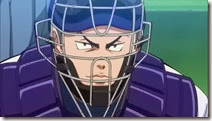 |
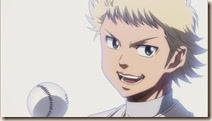 |
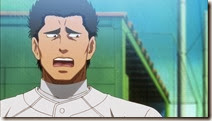 |
 |
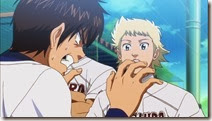 |
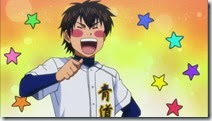 |
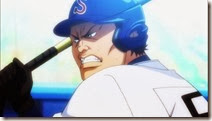 |
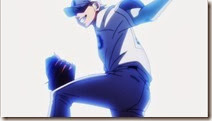 |
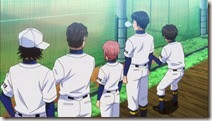 |
 |
 |
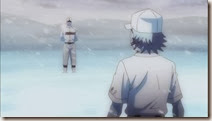 |
 |
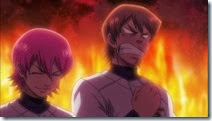 |
 |
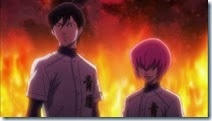 |
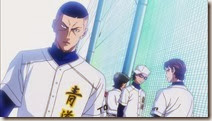 |
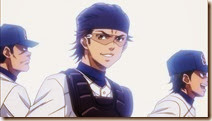 |
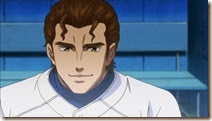 |
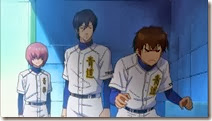 |
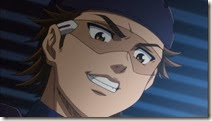 |
 |
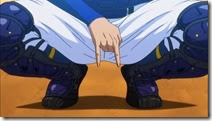 |
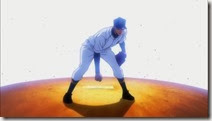 |


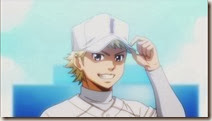
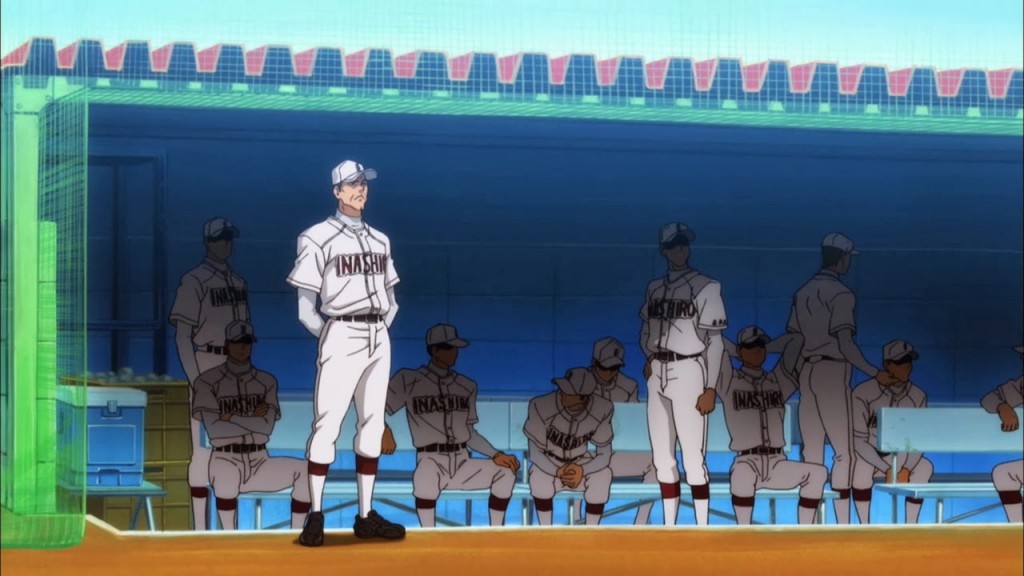
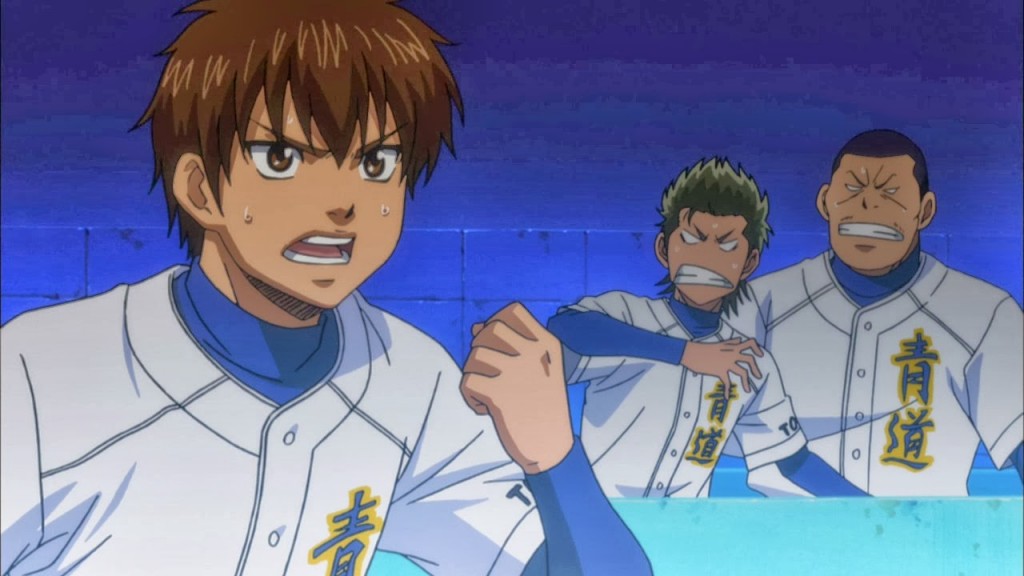
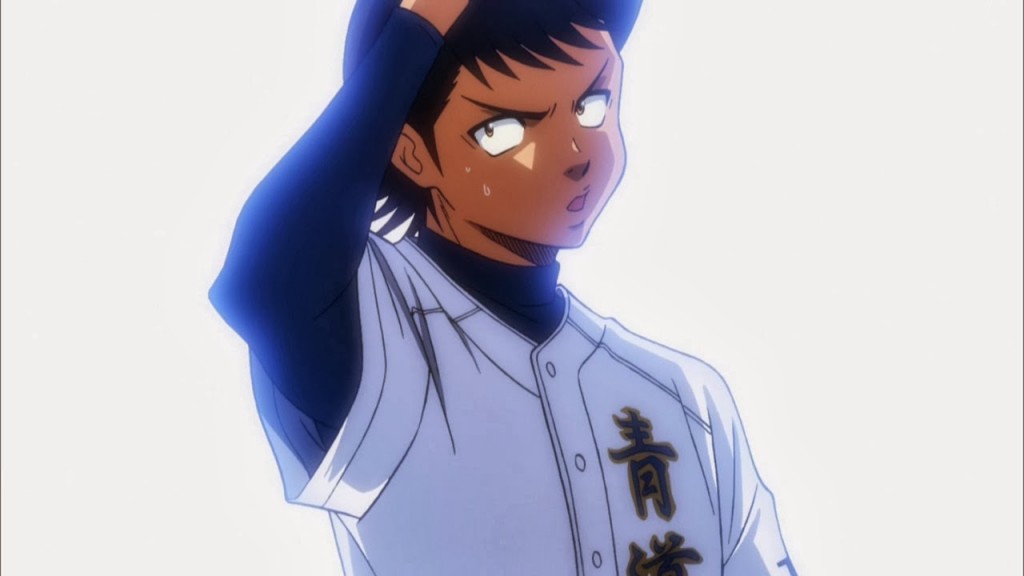
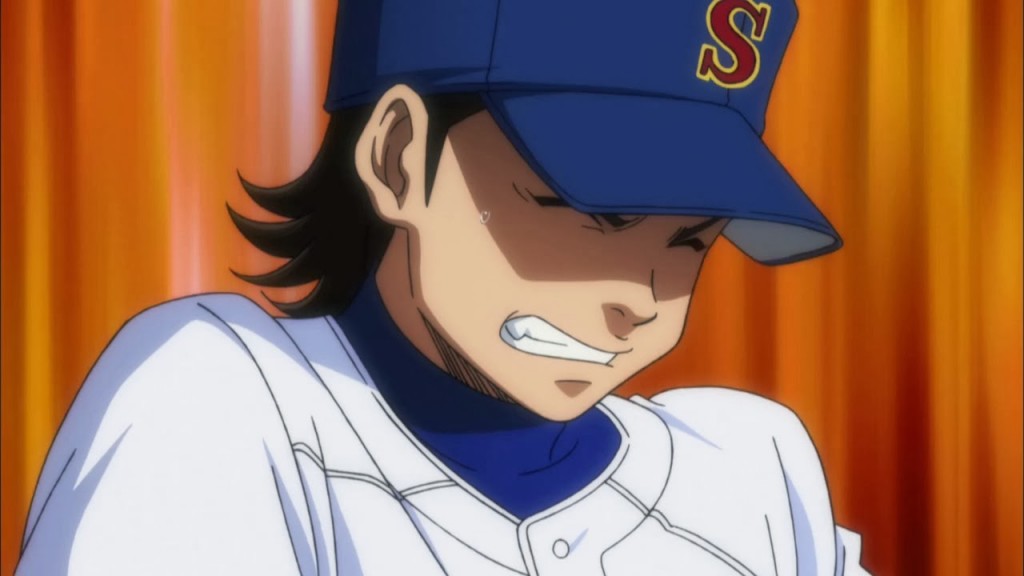
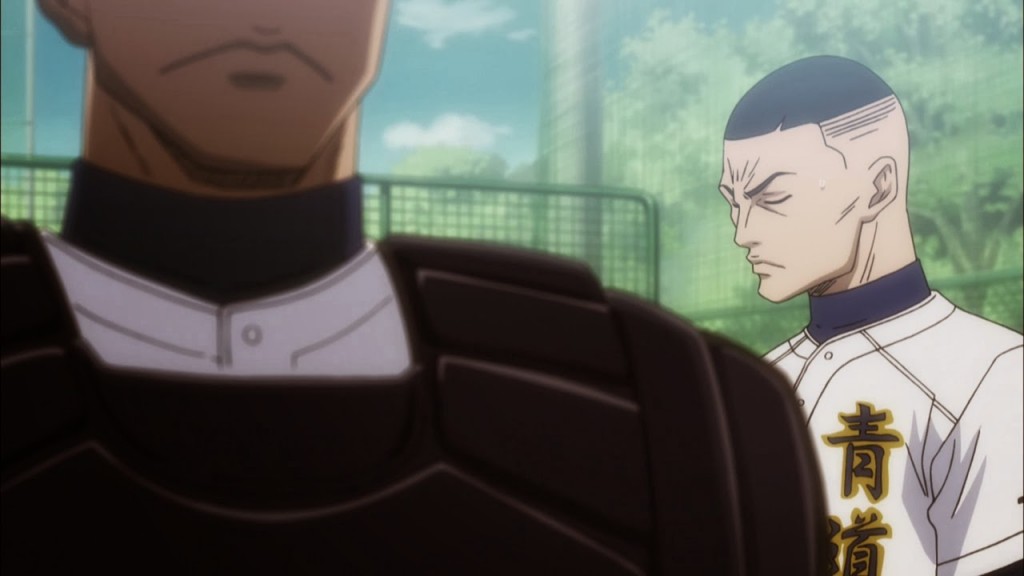
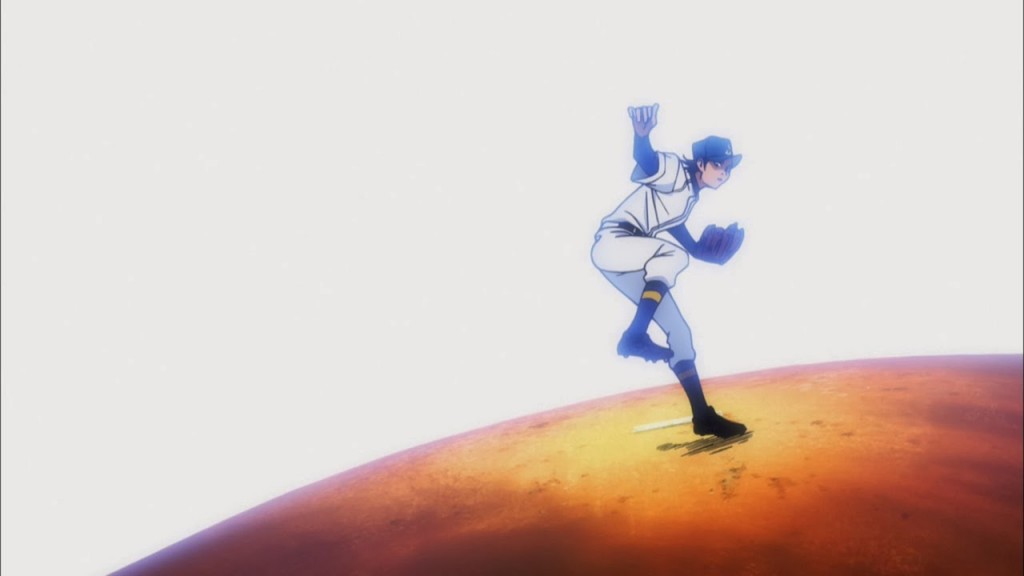
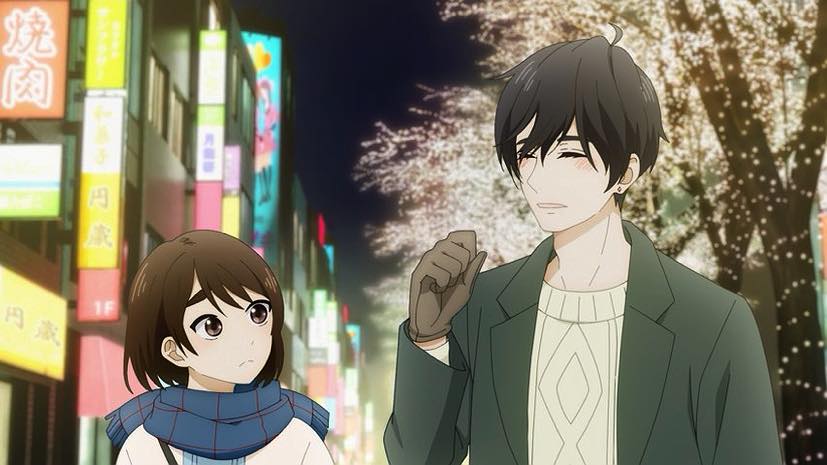
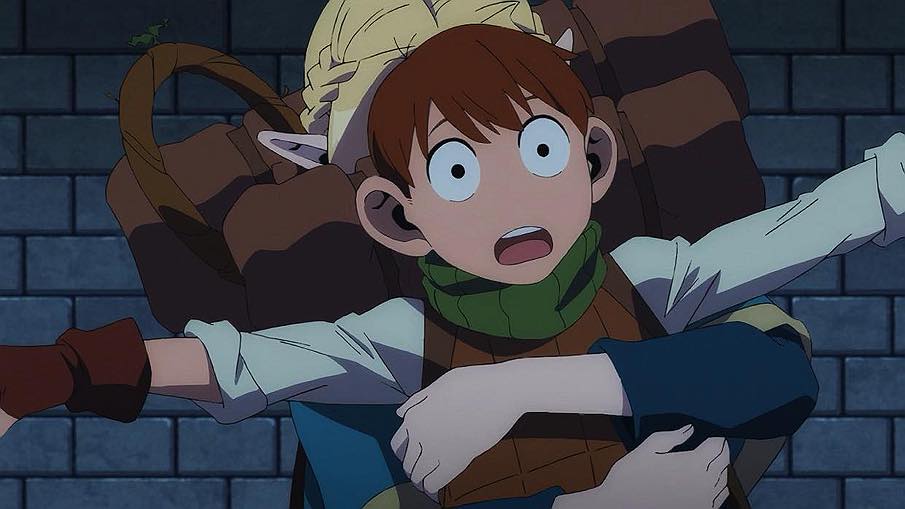
elianthos80
February 16, 2014 at 4:29 pmEnzo… you are a tease. I actually had to google what this Westminster Kennel Show is. Eeeeeh 8D (also… it's Terriers' winning land! )
Back to the episode sequence well that seemed to go on awfully long. And dem flaring steaming nostrils. I don't even. Eh. Ahah? Moving on…
The fated rival bit was so unsubtle that coupled with the preview title I don't how how safe I can believe in sport fate here. Plot curveball coming? Is Tanba going to be affected just when finally the Cheshire&Grumpy battery had started to work well? Dundundundunnn.
Also Eijun can't really shut up and avoid being baited in the most inconvenient ways, poor cluelessly genki soul. Even Kazuya was sweatdropping just a tad there X,D – although that might be due to both the blabbermouth and the overkill kick of silence – .
About Miyuki's behaving like a catcher I have a few ideas beyond the what you have written but for now I'll refrain from saying any more than: part of the reason behind his peculiar behavior? Chris (includes being not-Chris ).
Not an intense episode but it went by pretty quickly.
maverickmann84
February 17, 2014 at 12:06 amPitch count in Japan vs America is different for a few reasons: one being that pitching style varies so much in American raised players vs Japanese raised players. It boils down to more of power vs finesse. Japanese pitchers throw a significant amount of different pitches mostly off speed stuff, and American (Latino as well) pitchers tend to focus on the fastball/change with a slider/curve mixed in. There are far less power pitchers in Japan than in the Majors, and its one of the reasons why Japanese pitchers start their career off so well in MLB, and then end up getting shelled. MLB players aren't used to the variety of pitches Japanese pitchers have, but once they've seen them a few times they get accustomed to it and usually rock them. Look at Daisuke Matsuzawa or Nomo who started their careers off well, but quickly faded to mediocrity. Tanaka has some good power, so he should be able to do well in the majors, but theres no telling. Recently some teams in the US are trying to get away from the pitch count as a hard rule for pitchers bc of the idea that the reason high pitch counts cause injuries is because the pitchers aren't trained to handle that high of a count. And when they are trained for it they don't break down as often. Though its still pretty strict in that regard. I can tell you from personal experience that pitch count doesn't mean anything when you're out there, but bc you're always limited in practice to how many balls you throw you really start to feel it in you arm when you get up over 100 pitches. It's a lack of preparation for stamina. Japanese baseball = American baseball 60 years ago. Pitchers pitched more games then and longer into games that's why the records for single season wins and career wins won't ever be broken in the majors.
admin
February 17, 2014 at 12:20 amI think there are deeper reasons than that as well. There's a fundamental philosophical difference in regards to preparation that involves throwing on the side, running, etc. The Japanese have their way of prep, Americans have theirs. I also think it's too simple to dismiss Nomo and Dice-K that way, because Nomo had quite a few very good years and I think Dice-K (it's Matsuzaka, BTW) faded mostly due to injury. Now – it can be argued (and has been) that Japanese pitchers in the U.S. getting injured is because they switch to the American routine routine starts and in the off-season – but that's another debate.
maverickmann84
February 18, 2014 at 2:15 amI don't mean Japanese pitchers can't have success in the Majors, just that it's higher competition in MLB bc its the world's best players not Americas best. Personally I think having pitch counts determine playing time is silly, and that if you use long toss practice and don't limit the amount of total throws you can avoid injury better overall. It also depends a lot on each person's pitching motion. Some are harder on the ligaments than others. Haha I'm biased against Daisuke as a lifelong Yankees fan, and clearly never bothered to learn his name I guess. I'm not dismissing Nomo, as he did have some good years, but after his first two years he never had an ERA under 4 until 2002/2003 and had a career ERA over 4. It's just a different game in terms of Japanese teams playing unselfish small ball and a more technical game, and MLB having a more showy/home run emphasized game. Japan's baseball is like old school MLB when pitchers were true dominant factors and people didn't care about home runs as much. I like that style personally, but it doesn't necessarily lend itself to long term success for pitchers shifting to a different type of game. There's def a reason that Japan dominates the world baseball classic. Throwing many different types of not necessarily overwhelming pitches is tough to face if you aren't used to seeing it. Though I really hope Tanaka ends up being the star he can be in the majors. Hes got a very MLB style of pitching.